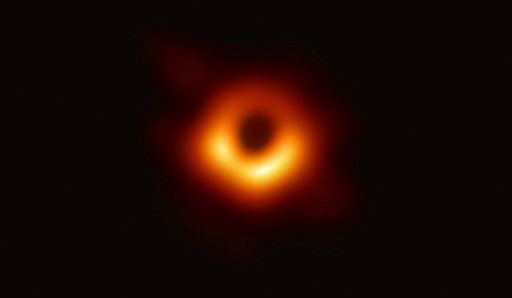Popular Reads
Top Results
Can't find what you're looking for?
View all search resultsPopular Reads
Top Results
Can't find what you're looking for?
View all search resultsBlack hole, flat earth and our petty quibble
This is the finest example of international cooperation which could revive the hope that what's best from humanity could materialize only if countries could join together and pool their resources.
Change text size
Gift Premium Articles
to Anyone
I
t is difficult not to overstate the significance of the Wednesday revelation on black hole, the most mysterious object in the universe (well, well, probably second after the elusive dark matter). This monstrous object that has long captivated both scientists, amateur astrophysics and science fiction fans and has been immortalized in some of the best works in popular culture like Christopher Nolan's movie Interstellar and Soundgarden's 1990s hit "Black Hole Sun".
First and foremost, a photographic evidence of a black hole is a confirmation of Albert Einstein's genius and that he was indeed could read the mind of god, or the universe, depending on whether you put your faith in science or, well, faith. It was Einstein who first predicted the existence of black holes in the general theory of relativity. Even the shape and glow of the black hole revealed on Wednesday matched Einstein's prediction. "Today, general relativity passed another crucial test," University of Waterloo astronomer Avery Broderick, a co-discoverer of the black hole said in a press briefing.
But more than proving the genius of Einstein, the unveiling of a black hole is the good news for everyone who has in recent years despaired about the current state of politics, the rise of political leaders who are skeptical of science and a wholesale rejection of science from sections of society. Things are so bad with the Enlightenment project that optimists like Harvard psychologist Stephen Pinker needed to make the case for science, reason and progress in his best-selling books Enlightenment Now.
As the current state of the world is getting more fractious, with political leaders vowing to make their respective country great again and that their polity should come first--to the point where some pronounced the death of globalism--the effort to chase the black hole was a repudiation of this parochialism.
The black hole revealed on Wednesday was at the center of M87 Galaxy, roughly 55 million light-years in distance from earth, and it would take a telescope the size of the earth to be able to see it, and that's exactly what scientists had done during their 10-year effort to catch a glimpse of the supermassive black hole. The Event Horizon telescope used to capture the black hole, is made up of a network spanning locations from Antarctica to Spain and Chile and was manned by more than 200 scientists from multiple countries.
This is the finest example of international cooperation which could revive the hope that what's best from humanity could materialize only if countries could join together and pool their resources. And as countries in the world cut back on their commitment to cooperate on trade, nuclear weapon elimination and development projects, these days space exploration is the field where countries still maintain good cooperation. United States and Russia may experience setbacks in their diplomatic relations, but onboard the International Space Station (ISS), scientists and astronauts from the two countries continue to conduct research.
The discovery of a celestial body that could validate the general relativity theory, arguably the greatest achievement in the history of mankind, ironically took place as more and more people shy away from science and its attendant benefits. The breakthrough in astrophysics today may have allowed us to peek into the darkest corners of the universe; catching a glimpse of more earth-like planets or gaining an awe-inspiring photographic evidence of universe in its early stage, but this achievement apparently has failed to enlighten those who believe that the earth is flat, that life emerged on earth 6,000 years ago or that vaccines should be banned due to religious reasons.
As astrophysicists from the Event Horizon telescope project announced findings from their work in Washington on Wednesday, officials in New York city declared a public health emergency and ordered mandatory measles vaccinations to halt an outbreak amongst members of the ultra-Orthodox Jews in Brooklyn. This is the broadest vaccination order in the US in nearly three decades, the Washington Post reported.
The news should come as a surprise, as the setback in vaccination drive traditionally happens in developing countries. Last year, the health ministry reported that the average coverage rate for the measles-rubella (MR) vaccination in Aceh is 7.01 percent, far lower than the 95 percent target. The provinces with the second and third lowest coverage rates are Riau and West Sumatra with 22.52 percent and 24.26 percent respectively. These three provinces are stronghold for conservative Muslim groups in the country. It does not help that the Indonesian Ulema Council has ruled that the MR vaccine is actually haram (forbidden) or at best mubah (permitted for Muslims) in an emergency situation.
The decision should have been easy to make. If the choice is between the health and welfare of your children and religious tenets founded more than a millennia ago, the former should take precedence over any consideration. But again, most of the times people could not be trusted to make decision for themselves. So when you decide to go to the polling station next week, you can forget about your petty quarrel with your neighbors on whom you should vote for. To quote British controversial author Richard Dawkins: "the universe doesn't give a damn how you feel".










